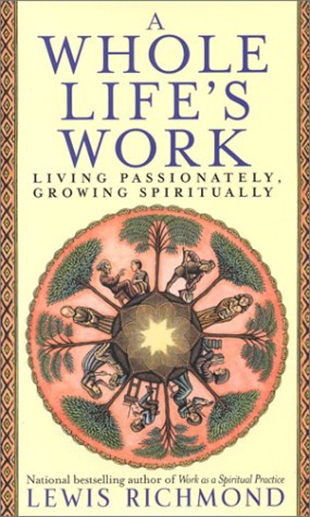Lewis Richmond, author of Healing Lazarus and Work as a Spiritual Practice, announces that the overall thrust of this book is to explore "the Consciousness Project," which he describes as "the individual's discovery of how to live his or her life in fullness, maturity and harmony with others, as well as the collective discovery that all the generations that have come before us and will come after." He is talking about our whole life's work, not just what is encapsulated in the job we do for income.
The author, who had a close encounter with death, now sees eight modes of work: Earner, Hobbyist, Creator, Monk, Helper, Parent, Learner, and Elder. These activities are arenas wherein we can savor life and find value on a daily basis. Beneath them are eight modes of inner work — "a kind of spiritual activity that complements and supports each of the eight modes of work." These are Precepts, Vitality, Patience, Calm, Giving, Equanimity, Humility, and Wisdom.
Richmond is an ordained disciple of Buddhist master Shunryu Suzuki Roshi and a lineage holder in that tradition. He leads the Vimala Sangha, a Buddhist group based in Mill Valley, California, and that is why his explanations of equanimity, right livelihood, and humility are so cogent. Explaining why the inner work that lies behind our jobs is so important, he writes: "The Earner's Work is what we all do to survive. In the process — and there is no help for it — we create a ripple in life's pond. Depending on what we do, we create footprints of disturbance or of restoration. The individual's footprint is small, but when combined with everyone else's it is large. We can simply take care of our needs without much thought about the larger footprint, or we can recognize that we are all complicit in the making of it and need to take responsibility for it. Recognizing the inevitability of our individual and collective footprints is the first step in understanding how to walk the world with footprints of restoration, of care, of compassion and love."
This example of compassion for others is a part of the larger inner work that must be done to make our time here worthwhile. Richmond's overview of a whole life's work is inspiring and edifying.
